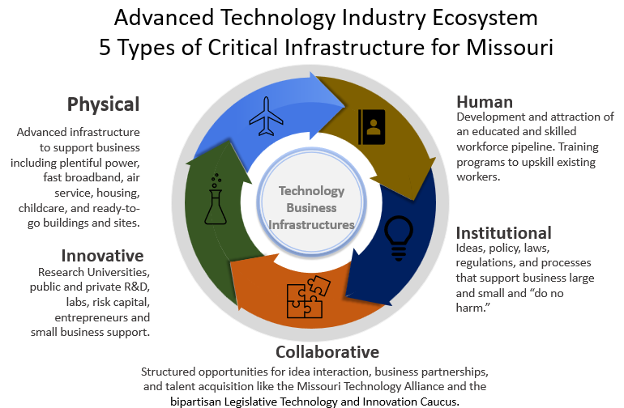By Ted Abernathy, Economic Leadership, LLC
The recently released Technology2030 report shows Missouri’s tech sector is continuing to grow. That’s good news, but now is no time for complacency. Across the country, major shifts are redefining how and where innovation happens. Driven by the accelerating pace of technology, a rise in entrepreneurship, evolving geoeconomics and a new wave of federal industrial investments, the geography of advanced industries has changed. By preparing for the next wave of change, supporting smaller technology entrepreneurs and continuing to strengthen the state’s technology infrastructure, even more success is possible.
From generative AI and spatial computing to robotics and automation, the pace of new technology adoption is no longer incremental—it is swift and often disruptive. This acceleration is affecting every Missouri industry, from agriculture to logistics to software development. AI is already transforming information technology, finance, insurance, legal services, marketing and administrative support. The expectation is that AI adoption will increase efficiency and reduce costs. Well-established companies risk being left behind if they cannot adjust.
With landmark legislation like the CHIPS and Science Act and the Inflation Reduction Act, the federal government has been investing billions into rebuilding America’s industrial base. In areas like bioscience, defense technology and ag-tech, Missouri has enjoyed new growth. But competition is fierce. States that can offer ready-to-go sites, a skilled workforce, abundant power, supportive regulations and strong public-private collaboration are the ones landing major projects.
For Missouri’s tech sector, new opportunities require thinking beyond traditional R&D and focusing on full-spectrum innovation ecosystems where design, manufacturing and digital infrastructure are all aligned. Companies should also be watching where public investment is flowing and look to co-locate near new industrial assets or research partnerships.
Support for small business
One of the most promising national trends is the sustained rise in entrepreneurship. Since 2020, business applications have stayed well above pre-pandemic levels. But the nature of entrepreneurship is shifting: the average number of employees per new business is shrinking, and more people are launching lean, digital-first ventures from their homes or local co-working spaces. Small businesses have always been important to communities, and now, with technological tools, entrepreneurial businesses can successfully compete for business across the country and the world.
Business support programs often overlook solo entrepreneurs or contractors who make up a rising share of the tech-enabled workforce. To stay competitive, Missouri can double down on supporting digital entrepreneurs—especially in smaller cities and rural regions. That means simplifying regulation, maintaining low taxes, expanding access to capital, mentoring, improving broadband infrastructure and offering flexible, low-cost workspace. Tech doesn’t just grow in gleaming towers; increasingly, it grows out of garages, basements and backyard startups.
Nurturing and growing technology small businesses is a major opportunity for Missouri. The state already ranks among the most affordable places to start a business, and it has a growing network of innovation hubs, accelerators and university partnerships.
Focusing on Missouri’s technology ecosystem
A technology ecosystem is typically defined as a network of interconnected organizations and institutions within a state that collaborates to enhance the state’s tech sector. In recent years, the Missouri Chamber has formed the Missouri Technology Alliance and the bipartisan Legislative Technology and Innovation Caucus to help support technology growth. It is the stewardship and coordination among collaborators that create excellence and set a state apart.
Other important infrastructures include human, physical and innovation assets that each contribute to Missouri’s competitiveness.

Missouri’s tech economy is on the rise—but so is the rest of the country. These trends make one thing clear: the future will belong to states that embrace change, support entrepreneurship and invest boldly in people and infrastructure. The question isn’t whether disruption is coming; it’s whether Missouri is prepared to turn it into opportunity.